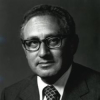Henry A. Kissinger

Henry A. Kissinger
Henry Alfred Kissingeris an American diplomat and political scientist. He served as National Security Advisor and later concurrently as United States Secretary of State in the administrations of presidents Richard Nixon and Gerald Ford. For his actions negotiating the ceasefire in Vietnam, Kissinger received the 1973 Nobel Peace Prize under controversial circumstances, with two members of the committee resigning in protest. Kissinger later sought, unsuccessfully, to return the prize. After his term, his advice has been sought by world leaders...
NationalityGerman
ProfessionStatesman
Date of Birth27 May 1923
CountryGermany
Even a paranoid can have enemies.
Leaders must invoke an alchemy of great vision.
Each success only buys an admission ticket to a more difficult problem.
He [Deng Xiaoping] said that he did not understand why we failed to grasp that the alternative was not democracy, but total chaos and risking all the reforms that had been achieved.
Moderation is a virtue only in those who are thought to have an alternative.
I grew up as a discriminated minority in a dictatorship, so obviously the issue of human rights is a matter of concern for me.
The longer I am out of office, the more infallible I appear to myself.
I knew Deng Xiaoping when he came out of prison. He had, after all, been imprisoned for nearly ten years by Mao. I know what China looked like before he took over, and so in my own mind, I don't think of Deng Xiaoping as an oppressor. I think of somebody who, faced with that crisis, made a very painful and decision with which I cannot agree. But I also think of him as a great reformer.
Art is man's expression of his joy in labor.
I don't see why we need to stand by and watch a country go communist due to the irresponsibility of its people. The issues are much too important for the Chilean voters to be left to decide for themselves.
It is one of history's ironies that Communism, advertised as a classless society, tended to breed a privileged class of feudal proportions.
I would have said, before the World Trade Center events, that he would try to get a normal relationship with China - making clear to China what the limits are of what America can accept, but also showing understanding for some of Chinese necessities. I thought he was moving towards the position that I have more or less advocated.
It is always easy to divide the world into idealists and power-oriented people. The idealists are presumed to be the noble people, and the power-oriented people are the ones that cause all the world's trouble.
Of course, in principle, they're against it. We are the ones that keep asking them what they think about it. I think their basic concern is a land-based missile defense of Taiwan hooked into the American communications and other systems, which in effect would make Taiwan then an outpost of the United States. That is a concern they frequently express. A missile defense shield of the United States, while they may not like it, it is not a big obstacle to our relationship.